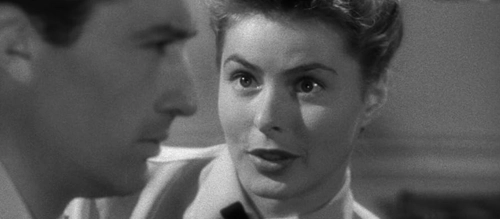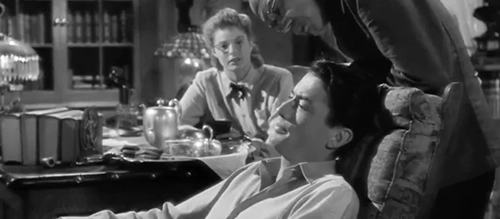
Spellbound (1945)
Director: Alfred Hitchcock
Screenwriters: Ben Hecht, Angus MacPhail
Starring: Ingrid Bergman, Gregory Peck, Michael Chekhov, Leo G. Carroll, Rhonda Fleming
Spellbound finds itself in a strange position as being simultaneously one of Alfred Hitchcock’s most beloved pictures and one that is almost constantly overlooked. It’s certainly a well-made film, with great performances and influential visuals, but when asked about his best directorial efforts, it is more likely that Psycho, Vertigo, and the ilk, will be mentioned over this fairly experimental piece. Starring Gregory Peck and Ingrid Bergman, it follows Bergman’s psychoanalyst, Dr Constance Peterson, who falls in love with Peck’s Anthony Edwardes, the new director at the mental institution she works at. When Edwardes has strange fits and outbursts, she begins to suspect that not all is right with him, and a deep dive into his subconscious brings up dark memories and the clues to a murder case.
Despite the six Oscar nominations (and a win for Best Score by Miklós Rózsa), it is the dream sequence, with visuals designed by renowned surrealist artist Salvador Dalí, for which the film is remembered. Complete with images reminiscent of the melting clocks in his famous 1931 painting Persistence of Memory, and a pair of scissors cutting across a painted eyeball which clearly takes from the influential Un Chien Andalou from 1929, created by himself and Luis Buñuel, it is somewhat of a shock to remember that the film is two thirds of the way through before the sequence plays out. Considering that much of the film’s reputation rests on this sequence, you might expect it to play a much more prominent role in the film, but it doesn’t. Instead, most of it is concerned with Bergman and Peck and their growing relationship amidst the terrors of Peck’s mind, and Bergman’s interesting interplay between the roles of mother, lover, and doctor, often simultaneously.
This relationship is a little overdone, and the instantaneous nature of Bergman’s falling for Peck is bordering on ridiculous, needed almost purely for plot purposes, but nonetheless doubly works for the ‘spellbound’ title of the film. It is an early film about psychoanalysis, so much so that it needed to be given a big title card at the beginning to explain the term. Bearing in mind that Freud released his influential Interpretation of Dreams only in 1899, and Carl Jung’s conflicting works against his former friend began to hit home in the 1910s and 20s, it’s important to note that these ideas were seen as revolutionary at the time, if done to death now. This is why Michael Chekhov’s character Dr Alexander Brulov is essentially a Freud stand-in, in accent, appearance, and profession. The concept of using psychoanalytic theory and the interpretation of dreams as part of a mainstream Hollywood mystery thriller was genuinely new territory. The ideas are perhaps laughable now, but only because it has been a century since they were introduced and a lot of work has been done on the pros and cons of psychoanalytic theory. The plot in this film, however, bordered on science-fiction at the time of release.

A film about the differences between the conscious and the unconscious of Peck’s mind therefore mirrors Bergman’s instinctual attraction for Peck overriding her cold, scientific nature. It also reflects the twists and turns that eventually reveal the ending of the film, subterfuge and missteps, even a Freudian slip giving away a final secret to reveal the identity of the film’s villain. Even if the relationship between the two is rushed and then forced the whole way, the chemistry between the two of them does indeed keep us spellbound throughout, and ties in thematically with the film’s ideas.
Even though the final act is incredibly constructed and the opening a genuine mystery, the slower sections tend to drag. It takes a good ten to fifteen minutes for the film to properly get going, and the journey out of the city is far too steady and cumbersome without much to keep us going. Then again, even these cumbersome moments aren’t all bad. Hitchcock still directs somewhere near his best, and the actors are working their magnetic magic in every frame.
Even when Hitchcock films aren’t 100%, they’re far better than the best of 90% of directors, and Spellbound is a wonderful example. It is a great film with great performances; one filled with thrilling twists and turns so enjoyable that it manages to smooth over the more lethargic moments. With a memorable dream sequence that would see it perhaps influence even the dream sequence in Hitchcock’s own Vertigo over a decade later, it manages to enthral even today, nearly 80 years after its release.
Score: 19/24

